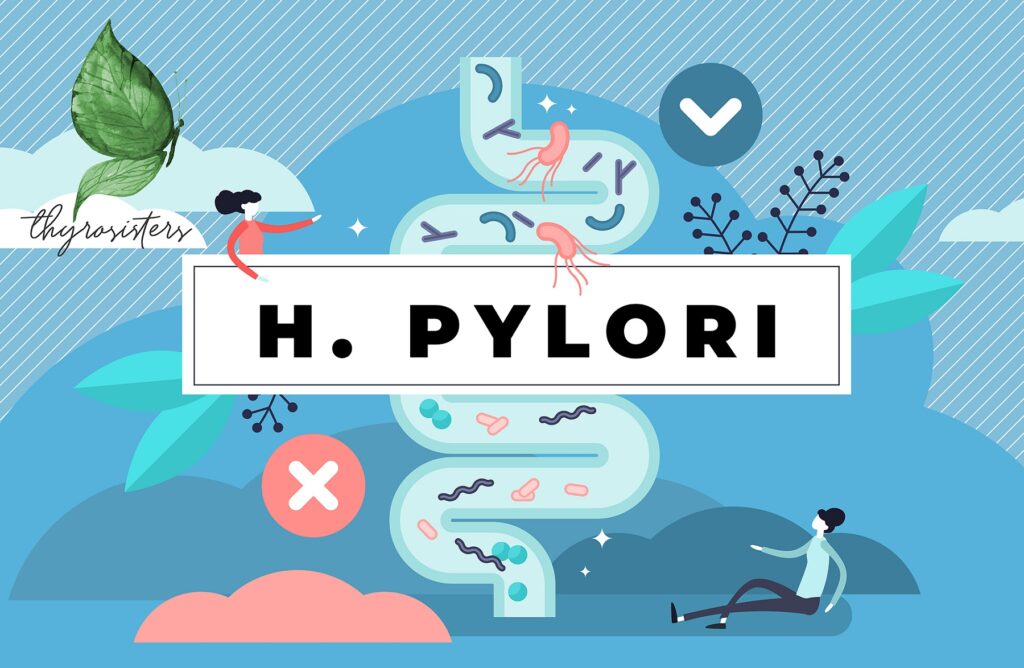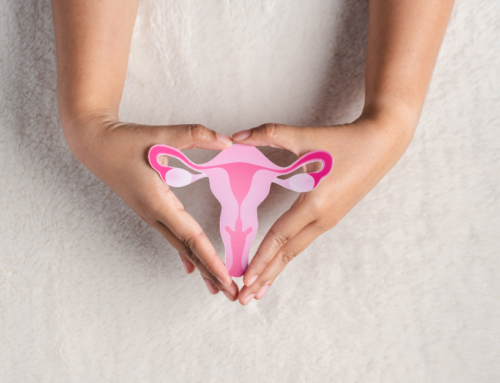Is a Tiny Bacteria Called H. Pylori the Cause of Your Leaky Gut and Other Stomach Issues?
 I love to focus on all the beautiful things life offers us, from the sound of the birds in spring chirping out my window to the smile of a friend (even if it is over a Zoom chat these days!). Unfortunately, sometimes unpleasant things can insist on being seen and felt. One of the most unpleasant experiences our bodies can dish out is stomach troubles, like upset stomach, burning pain, nausea, and more. If you’ve been experiencing these symptoms, you may have a leaky gut, which could be caused by a tiny and ancient bacteria called Helicobacter Pylori.
I love to focus on all the beautiful things life offers us, from the sound of the birds in spring chirping out my window to the smile of a friend (even if it is over a Zoom chat these days!). Unfortunately, sometimes unpleasant things can insist on being seen and felt. One of the most unpleasant experiences our bodies can dish out is stomach troubles, like upset stomach, burning pain, nausea, and more. If you’ve been experiencing these symptoms, you may have a leaky gut, which could be caused by a tiny and ancient bacteria called Helicobacter Pylori.
What Is Helicobacter Pylori?
Believe it or not, your digestive system is teeming with bacteria. Before you shout, “Ew!” know that this is actually a good thing… most of the time. Most gut bacteria are harmless and many types of gut bacteria are actually helpful. They create a healthy digestive biome that can help you better digest your food. However, not all bacteria are our friends.
Helicobacter Pylori, better known as H. Pylori, is a small, spiral-shaped bacteria that is actually very common. Estimates suggest that roughly 50% of people are carrying H. Pylori around in their digestive system. With so many people hosting H. Pylori, why is it that half the population isn’t suffering from stomach ailments?
For the majority of carriers, H. Pylori is harmless and just hangs out as part of their gut flora. However, if your gut balance is off, H. Pylori may spread quickly, overwhelming your digestive system and leading to your unpleasant tummy troubles. If left unchecked, H. Pylori may even cause severe symptoms.
How Does H. Pylori Affect Your Digestive System?
H. Pylori has been around for a long time and has learned to adapt to the human digestive system. It survives by releasing enzymes that reduce the acidity of your stomach to create an environment that it prefers. (Imagine an unwelcome house guest turning up the thermostat so that everyone but your unwanted guest is sweating buckets.)
Using its long tail, H. Pylori can propel itself to the lining of your stomach, where it burrows in and quickly begins multiplying. Before you can say house crasher, the H. Pylori will colonize your gut lining. Yep, now you can yell, “Ew!”
As it makes itself at home in your stomach lining, H. Pylori begins releasing toxins, which attack and destroy your stomach cells. It can also migrate throughout your stomach killing cells as it goes and even burning holes through the lining of your stomach. This is how H. Pylori can eventually lead to a leaky gut.
Where Does H. Pylori Come From?
How do you get H. Pylori, and why is it so common? Many people actually contract H. Pylori as children. The bacteria are really good at hiding innocently in your system and you may carry it around for years or even decades before the conditions in your stomach are just right for H. Pylori to start multiplying and messing with your digestive health.
H. Pylori can be spread in a number of ways, including:
- Orally – By kissing, sharing unwashed utensils, or drinking from the same cup as someone with the bacteria.
- Contaminated water – Most often this occurs when swimming in lakes or streams that have been contaminated with fecal matter.
- Animals – Many different animals, such as sheep, goats, cows, and cats can spread H. Pylori to humans.
- Sexual activity – Sexual transmission of H. Pylori between partners is also possible.
Negative Health Symptoms of H. Pylori
 The majority of people with H. Pylori in their system will never know it, but if H. Pylori becomes a problem for you, it will likely begin with low-grade inflammation in the lining of your digestive system. You might begin to experience hiccups, belching, an irritable digestive system, and stomach pain. If you don’t address these issues, the symptoms could grow worse.
The majority of people with H. Pylori in their system will never know it, but if H. Pylori becomes a problem for you, it will likely begin with low-grade inflammation in the lining of your digestive system. You might begin to experience hiccups, belching, an irritable digestive system, and stomach pain. If you don’t address these issues, the symptoms could grow worse.
Peptic Ulcers
An infection of H. Pylori develops into peptic ulcers in roughly 10 – 15% of cases. You’ll likely experience a peptic ulcer as stomach pain that can be dull, sharp, or burning. You may also experience nausea and vomiting as well as weight loss.
Inflammation
When H. Pylori attacks, your body responds by creating inflammation. Long-term bouts of inflammation can break down all sorts of processes in the body and even lead to:
- Insulin resistance
- Iron-deficiency anemia
- Skin disease
- Non-alcoholic fatty liver disease
- Obesity
- Heart disease
Stomach Cancer
Perhaps the scariest trick up the sleeve of H. Pylori is that it can prompt cancer growth. In fact, the greatest risk factor for developing gastric cancer is… you guessed it, an infection of H. Pylori.
Yikes! For such a small bacteria H. Pylori can pack a big punch. Fortunately, you can fight H. Pylori and heal your gut.
How to Test for H. Pylori
Before you can begin treating H. Pylori, you must test to make sure this is the bacteria causing your digestive issues. Stomach troubles, including leaky gut, can be caused by a wide variety of things, including autoimmune disorders, like Hashimoto’s hypothyroid disease.
The most common way to test for H. Pylori is to use a urea breath test. Basically, you swallow a pill, drink a liquid, or eat a pudding solution that contains carbon molecules. If you have H. Pylori, its enzymes will release the carbon, which can then be detected in your breath. Pretty neat, right?
Other testing methods include stool tests, a biopsy of your digestive tract, and blood testing. It’s important to note that blood testing is not the most effective method of discovering or tracking an H. Pylori infection.
If your test comes back positive for H. Pylori, then you have the culprit for your unhappy gut. It’s time to fight!
Treating a Helicobacter Pylori Infection
I’ve got some good news for you. H Pylori infections are treatable. Of course, that doesn’t mean it will be easy. H. Pylori is known for being highly adaptable, so the first step is to get tested, rather than speculate. Be patient and carefully monitor your symptoms. It may take a while until the bacteria is defeated and you begin to feel better.
 However, treating your H. Pylori is only the start of your journey back to healing. Remember how I told you at the beginning of this article that many types of bacteria in the gut are actually helpful? Well, antibiotics don’t distinguish between good and bad bacteria. Taking a strong dose of antibiotics can wipe out a lot of your existing digestive biome, which means you’ll need to take steps to promote new and healthy gut flora. (This time without H. Pylori!)
However, treating your H. Pylori is only the start of your journey back to healing. Remember how I told you at the beginning of this article that many types of bacteria in the gut are actually helpful? Well, antibiotics don’t distinguish between good and bad bacteria. Taking a strong dose of antibiotics can wipe out a lot of your existing digestive biome, which means you’ll need to take steps to promote new and healthy gut flora. (This time without H. Pylori!)
This is where a holistic health practitioner like myself can step in and help. Together, we can develop a plan to restore your gut with the help of healthy foods, natural supplements, and more. Also, it’s important to recognize that H. Pylori may not be your only issue. In fact, it may have been able to thrive due to an underlying condition, such as an autoimmune condition. A functional health specialist like myself can test you for additional conditions and create a plan to address, manage, and heal all your conditions.
It all starts with a Clarity Call. Schedule one with me today. I can’t wait to hear from you!
References:
- Bravo D, Hoare A, Soto C, Valenzuela MA, Quest AF. Helicobacter pylori in human health and disease: Mechanisms for local gastric and systemic effects. World J Gastroenterol. 2018;24(28):3071-3089. doi:10.3748/wjg.v24.i28.3071
- Diaconu S, Predescu A, Moldoveanu A, Pop CS, Fierbințeanu-Braticevici C. Helicobacter pylori infection: old and new. J Med Life. 2017;10(2):112-117.
- Ghasemian Safaei, Hajieh & Rahimi, Ebrahim & Zandi, Ashkan & Rashidipour, Alireza. (2011). Helicobacter pylori as a zoonotic infection: The detection of H. pylori antigens in the milk and feces of cows. Journal of research in medical sciences: the official journal of Isfahan University of Medical Sciences. 16. 184-7.
- Parikh NS, Ahlawat R. Helicobacter Pylori. [Updated 2020 Aug 10]. In: StatPearls [Internet]. Treasure Island (FL): StatPearls Publishing; 2020 Jan.





